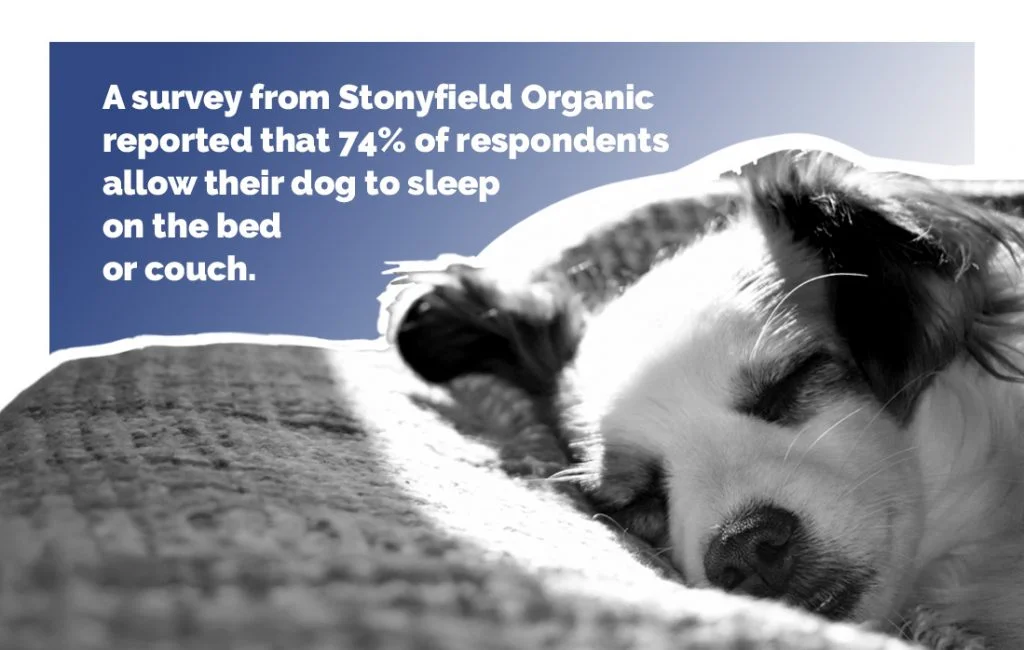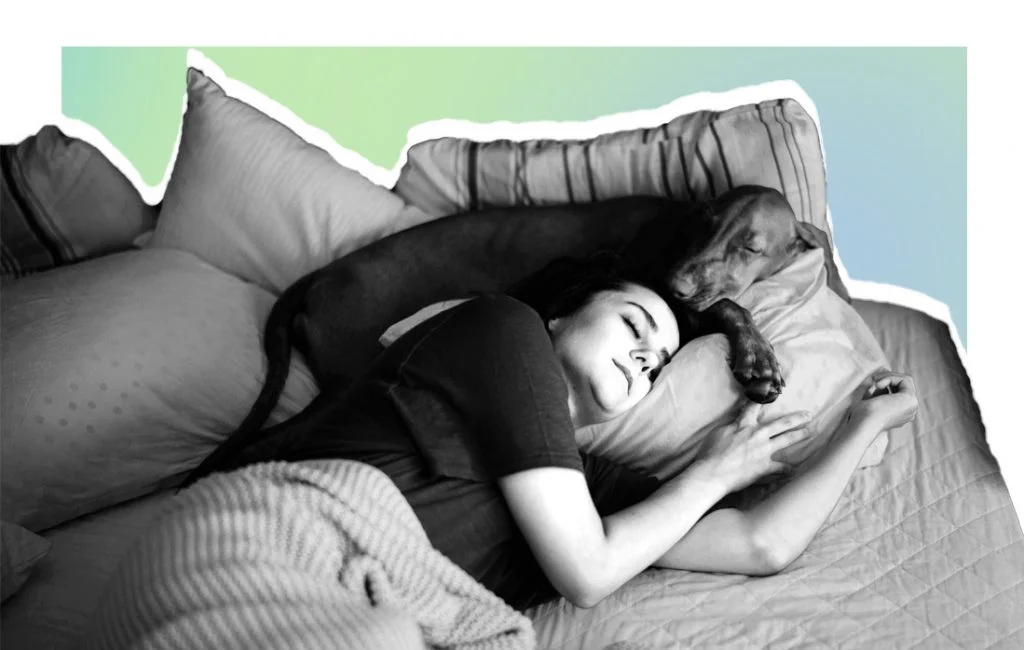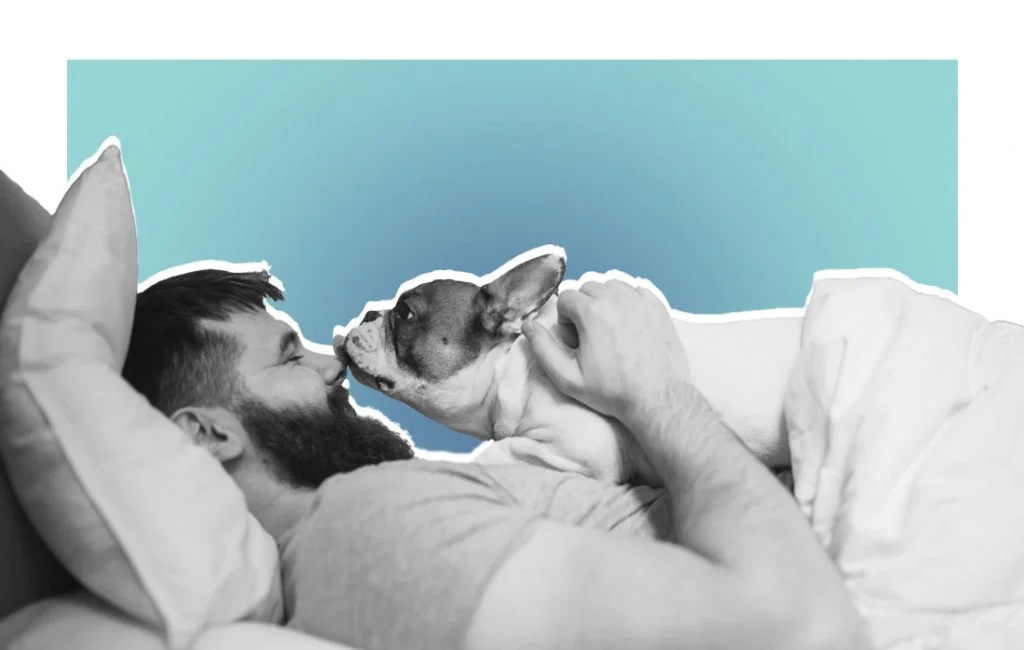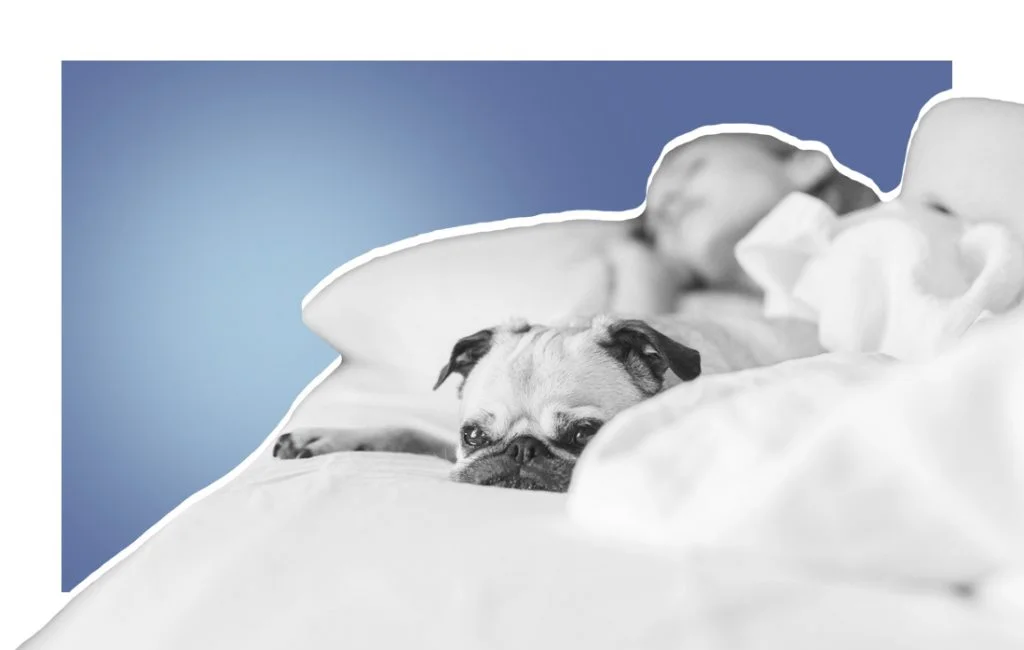
Whether you’re getting a new kitten or you’ve had a loyal pup by your side for years, we often can’t help but wonder, should they sleep with us? Many things come to play when sleeping with a pet. You may have a partner in bed with you, someone has allergies, or maybe the pet is just too big. And overall, is it good for you if you do want them in bed with you? Presenting, the ultimate guide to sleeping with your pet – all those burning questions answered!
Who Is Sleeping With Their Pets?
If you sleep with a pet, you’re not alone. In fact, according to a recent survey from Stonyfield Organic on how close we’ve become with our pets since quarantine, 74 percent reported they allow their dog to sleep on the bed or couch. (1)

The first question you may be wondering is this: Why do we love to sleep with our pets? It’s because around the world, and in America in particular, we treat our dogs and cats as members of the family. So if a dog is technically a family member, it makes it that much harder to shut them out of our bedroom.
However, when it comes to Americans and our sleep habits, we’re not the best when it comes to getting a good night’s rest. The Better Sleep Council released a 2018 survey that scored Americans as C- sleepers. We’re dealing with sleep deprivation, sleep apnea, and chronic aches and pains. Could any of this be linked to sharing our beds with our pets?
Sleeping with a dog or cat doesn’t appear to be the major reason we aren’t sleeping great. There are a lot of studies out there on how different factors can affect our slumber, like stress, light exposure, and sleep position. Light exposure, for instance, is said to be a big contributor to bad sleep habits, as it can disrupt your circadian rhythm and trick your brain into thinking it’s time to be awake. However, when it comes to looking at how sleeping with a pet affects our sleep, the number of studies aren’t as prevalent. (2)
Still, that’s not to say there are no arguments for or against sleeping with a pet, and whether or not your furbaby is helping you get those needed Zzzs. There are a number of medical and sleep experts who have weighed in on this debate. Let’s break down both sides of the argument.
How to Sleep With Your Pet
So, what does this all mean? Should you or shouldn’t you sleep with a pet? As most things go, the answer is “it depends.” However, we can explain what factors to look out for so you can make the best sleep decision for everyone — pets included.

Firstly, we can’t ignore that the most recent research found sleeping with your dog in the same room won’t disrupt sleep. So, if you have a quiet pet who knows how to obey, this is a great compromise.
However, a pet might be used to sharing a bed with its owner. If that’s the case, here are some tips to wean them off and keep everyone happy:
Get them their own bed. Pet beds are quite common nowadays, with a handful of major bed manufacturers offering beds made especially for your furry companions. The most important thing to do is give your pet a great bed alternative, so they feel happy and comfortable. Make sure it’s durable too – BetterPet has some great recommendations for chew-proof beds. (3)

Chyrle Bonk, a veterinarian working with excitedcats.com, advises that “If you choose to sleep with your pet, make sure there’s enough room for both of you so that you won’t be fighting for space. If you or your pet is a light sleeper, consider setting up a bed for your pet on the floor next to you rather than in the bed with you. You may still get the comfort of having them close without as much waking up during the night.”
Learn the “off” and “no” commands. Make sure your pet understands “off” and “no” — this applies more to dogs than cats. If your dog jumps up on the bed, say “off” or “no” right away, and make sure they’re trained to respect the commands.
Be diligent — but reward them too. Some dogs and cats simply can’t handle being locked out of a room while you sleep. They’ll whine or meow until they get their way. It’s okay to let them into the bedroom — just try your best to keep them off the bed if they’re known to be disruptive. Be diligent about keeping them off the bed, but reward them too to help them stay happy in their pet bed. Use treats or other pet training tactics so they quickly learn over time that their pet bed, not the human bed, is for them.

Martin Reed, certified clinical sleep health educator (CCSH) and the founder of Insomnia Coach, finds that “If you are happy sleeping with your pet, there is no reason to stop. However, if you find sleep difficult, you may want to try sleeping without your pet for a week or two to see if that has any effect on your sleep. You can always start by not allowing them on the bed, and then progress to not allowing them in the bedroom.”
And as always, make sure you’re sleeping on the best mattress possible for your needs, which can rule out any additional concerns.
How to Sleep Train Your New Pet
When it comes to sleeping during the day, the American Kennel Club (AKC) recommends leaving puppies undisturbed. This is especially important so that a puppy isn’t dependent on you to fall asleep. You should also keep them on a schedule. For example, they might be ready to go outside for a walk or playtime. With this schedule, you will want to know the signs of an overtired puppy. Leading them to their crate or sleeping place is the best way to wind them down.

Additionally, It’s important to show a new pup where to sleep. “If he seems drowsy, encourage him to nap in his safe place: a crate, a dog bed, or a quiet place in the house where he can nap undisturbed. It may take time for him to get the idea, but eventually, he’ll recognize that spot as the place for sleep,” says the AKC.
As for nighttime, just like humans, a new puppy needs a routine. Play, cuddle, go outside, and then head to bed around the same times each day. It’s a good idea to make their sleep space, like a crate, as inviting and sleep-promoting as possible. This means a clean and comfortable bedding area that is in a dim-lit and quiet room. And finally, just like a human baby, expect interruptions like barking, howling, or crying. Address interruptions quickly and efficiently, then steer them back to bed. (4)

Paola Cuevas, a Veterinarian, MVZ, and Behaviorist with petkeen.com also notes dogs’ evolutionary history of sleeping together. She says that” Sleeping in a group is a survival method for the whole pack. They will mutually take care of each other and defend the group from any potential threats.” Cuevas also says that “It is not uncommon for socialized cats to sleep together and in some multi-pet households, this behavior is even observed with cats and dogs snuggling together. “ With this in mind, perhaps you could try grouping numerous pets together at bedtime, if you have more than one, either through different beds next to each other or one big bed on the floor.
Weighing Both Sides: The Pros and Cons
Now that we know how to sleep with and sleep train our pets, it’s time to get down to the pros and cons. Here are the potential sleep benefits and negatives of snoozing with a beloved companion.
The Benefits of Sleeping With a Pet
Pets relieve stress and anxiety. Science has supported how human and animal interaction can reduce stress. (Therapy dogs, anyone?) Johns Hopkins Medicine says cuddling close with dogs also lowers cortisol levels, a hormone associated with stress. Because of this, many people conclude since pets help relieve anxiety, and anxiety is a leading reason for poor sleep, we might as well cuddle up with them at night.
One study found that animal-assisted activities lowered depressive symptoms. This revelation only leads us to assume that sleeping with a dog would even better combat depression. (5) Our friends at Casper write that the company of a dog “helps us relax and increases our flow of oxytocin, the love chemical.” (6)

Dr. Maureen K. Murithi, a veterinarian working with hepper.com, also speaks to the chemical benefits, writing, “Co-sleeping with your pet helps to promote the production of serotonin which is a happy hormone. This, in turn, helps sleep quality, reduces stress levels, decreases loneliness, and eases the effects of depression. Sleeping next to your pets also helps to reduce blood pressure which promotes cardiovascular health.”
They make you feel safe. Ever have trouble falling asleep when you’re home alone? Pets often help their owners feel safe and secure, which can make falling — and staying asleep — a lot easier. In fact, the Mayo Clinic conducted a small survey with 150 people. The 49 percent of them who owned pets reported feeling more safe and secure at night, which led to better rest. (7) Another survey that covered sleep quality in women showed that having dogs as your bed partners, more so than human partners, disturbed sleep less often and offered more feelings of comfort and security. (8)
Bonk tells us that “Having a warm body with a steady heartbeat sleeping next to you can calm nerves and help people sleep better. It also may give people a sense of security.” Bonk also notes the increase of dopamine, another feel-good hormone, which she says when paired with oxytocin can improve both your mental state and sleep.
They may help you sleep better. While research is a bit slim, there is some evidence that supports sleeping with a pet to improve sleep quality. This point is basically a combination of our points above; if you feel safe, comforted, and relaxed, you’ll, in turn, have a better chance of sleeping better.
One study, which was published by Mayo Clinic, evaluated the sleep patterns of 40 humans and their dogs. Researchers used sleep trackers to actually evaluate sleep quality versus just surveying their participants. They found that with a dog in the bedroom, both dogs and their owners slept well. Humans had a mean sleep efficiency—aka the percentage of time spent asleep—of 81 percent, while dogs had a sleep efficiency of 85 percent. (Side note: Levels over 80 percent are what people should aim for.) (9)

A whole other benefit is having a service animal. New Life K9s Service Dogs write that, “One of the lesser-known skills of service dogs is their ability to be trained to recognize when an individual is experiencing sleep disturbances. Service dogs can be trained to recognize cues and disrupt active behavioral patterns stemming from sleep disorders, scenarios of emotional distress, or physical health challenges.” They state that these animals can be trained to look out for things like nightmares, night terrors, narcolepsy, obstructive sleep apnea (OSA), and sleepwalking. (10)
They keep us warm. There’s less science to back this one up, but there is a lot of anecdotal information from pet owners who say their dogs keep them warm at night. Since dogs do a great job at keeping themselves warm in cold climates, if you have an infamously cold bedroom or live in a cold climate, snuggling up with a dog might help keep you warm. Plus, scientists from a Swiss study found that warm feet and hands were the best predictors of rapid sleep onset. Perhaps have the pup or cat sleep at the foot of the bed. (11)
Finally, have you thought about the benefits for the pet itself? Paola Cuevas says that whether it’s “the effect of body heat or the feeling of security, maybe they just really like the smell of their owner or the petting they provide. What is certain is that nature is wise and if animals are choosing to sleep with you they are benefited from it one way or another.”
While all of this sounds great, there are always two sides to every story. The other camp explains how sleeping with a pet can disrupt sleep. This is for a handful of reasons: They steal the covers, they snore, they take over the entire bed, or they wake up and walk around in the middle of the night.
Downsides to Sleeping With a Pet
The Mayo Clinic Proceedings study that looked into whether a dog on the bed or in the bedroom disrupts sleep wrote, “Humans with a single dog in their bedroom maintained good sleep efficiency; however, the dog’s position on/off the bed made a difference.” They found that human sleep efficiency was lower with a dog on the bed, versus just being in the room. Bonk notes that we can keep our pets up as well, which could make them grumpy in the morning, just like us humans get.

Another study that looked at the association between pet ownership and sleep found that “owning a cat, the most prevalent pet group in the present study, was associated with increased odds of sleeping less than the recommended seven hours per day.” Researchers explained that this data cannot automatically let us assume that “cats represent a risk factor for short sleep duration,” and that future studies should investigate this further. (12)
If you’re a light sleeper. If you’re a light sleeper, it’s probably best to leave a pet off the bed or out of the bedroom entirely. While sound machines and eye masks are helpful accessories to keep distractions at bay, they might not combat all the noise a dog or cat could make.
If your pet is notoriously loud. Does your dog bark at anything? Does your cat love to jump on dressers and accidentally knock off picture frames? If they’re known for being loud, then it’s probably best to avoid sharing a bed with them.

Martin Reed dives a bit deeper into sleep interruption via sound stating that “dogs might bark if they hear a sound that may not have otherwise woken you during the night. If your cat has a collar with a bell, even a middle-of-the-night cat cleaning session can disturb your slumber!” (However, we’re thinking if your dog is warning you about a potential intruder or danger, this would be a potentially life-saving benefit!)
If you sleep with a partner. If you share a bed with a partner, there will already be limited space. Adding another living creature to the bedroom could leave both parties more cramped and lead to lots of tossing and turning. Furthermore, many people talk about a pet in bed impacting sex life; pets that share a bed can make it hard to initiate sex, and pets can even get protective and try to jump in between when things are starting to get hot and heavy. And since science does say sex before sleep can help people rest better (researchers from CQUniversity in Australia polled 778 adults and nearly 70 percent of the respondents said sex with orgasms helped them sleep better), you definitely don’t want any disruptions. (13)
Dr. Murithi tells Sleepopolis about the negative impacts, stating that “Finding a good balance between sharing your bed with your pooch and later is a delicate balance. As such, due to space and intimacy, one can opt to sleep in the same room with your pet but not necessarily on the same bed. The proximity still has the same positive effects as sleeping on the bed. In such situations, providing a soft warm bed for your pooch will be an added advantage.”

Sam Nabil, CEO and Lead Therapist of Naya Clinics, agrees, stating that “Frictions can occur between married couples that have contradicting views on letting a pet sleep on the bed due to personal circumstances. In these instances, compromising on the issue by setting boundaries or agreeing on a schedule fixes it.”
If you have allergies. If your allergies start to wreak havoc when spending too much time with your furbaby, then it’s probably best to leave them outside of the bedroom. You’ll be more susceptible to sneezing and wheezing, and it will surely disrupt those Zzzs. And while it may seem super obvious to avoid contact with dogs if allergies are an issue, more than a third of the American population is allergic to dogs or cats, according to the Asthma and Allergy Foundation of America. (14)
Bonk expands on the allergy factor saying, “people with pet allergies should never sleep with their pets in their bed. If their allergies are severe enough, they should consider not letting their pets in their bedroom at all. Respiratory allergies can increase a person’s likelihood of breathing difficulties during sleep.”

You also have to think about hygiene, warns Paola Cuevas. Cuevas states that “sleeping with a pet will definitely bring more microorganisms to your bed.” Some of the hygiene concerns could include “Soil, dirt,straight-up litter, and pet hair carry bacteria.”
In addition to allergens, Cuevas informs us that “There is an increased risk of disease transmission, whether it’s a bacterial infection on an open wound or by accidental ingestion. Salmonella, Campylobacter, and Leptospira are some of the zoonotic bacteria that can potentially be transmitted between your pets and you. If the pet has skin infections such as the fungal ringworm infection or a mite infestation you can end up having the same problems.”
If your pet steals the covers. If your pet loves to take the covers — especially if it’s a large, heavy dog — you’ll most likely be woken up in the middle of the night trying to steal them back. This is no recipe for a good night’s rest.
When it comes to your pet’s wellbeing, CNN Health writes that puppies and dogs with behavior issues may not be best suited for sleeping with you. Additionally, dogs with anxiety will fare better in their kennels, where they are often trained is a safe space. (15)
The Best Advice Giver: Yourself
We can’t ignore there is some evidence that supports how a pet in bed with you can improve sleep. At the end of the day, you need to evaluate your own sleeping habits and how a dog or cat might be affecting them. If you have a non-disruptive and well-behaved pet that doesn’t toss and turn or steal the covers, then try to share a bed. If you start feeling like sleep is becoming disrupted, wean them off the bed and onto a pet bed. However, if you’re sleeping well with a pet in the bed, there’s no reason to change something that is currently working.
Overall, listen to your body, consider tracking sleep habits, and do what’s best for you. While it might be hard to kick your furry companion off the bed, sharing the bedroom is a nice alternative. You’ll feel way more refreshed in the morning, which will lead to more energy to comfort and care for your pet during the day.
References
- Stonyfield Organic Extends #PlayFree Initiative. Stonyfield Organic. August 2020.
- Christine Blume, Corrado Garbazza, and Manuel Spitschan. Effects of light on human circadian rhythms, sleep and mood. Somnologie. August 2019.
- Madison Blancaflor Shoshi Parks. The best chew proof dog beds you’ll only have to buy once. Betterpet. December 2021.
- Jan Reisen. How to Make Sure Your Puppy Gets Enough Sleep. American Kennel Club (AKC). August 2019.
- Megan A. Souter and Michelle D. Miller. Do Animal-Assisted Activities Effectively Treat Depression? A Meta-Analysis. Anthrozoös. April 2015.
- Casper Editorial Team. All Things Snooze. Sleeping With Your Dog: 13 Science Backed Tips. Casper. May 2020.
- Lois E. Krahn, MD, M. Diane Tovar, RCP, and Bernie Miller, RPSGT, RCP, CCSH. Are Pets in the Bedroom a Problem? Mayo Clinic Proceedings. October 2015.
- Christy L. Hoffman, Kaylee Stutz, and Terrie Vasilopoulos. An Examination of Adult Women’s Sleep Quality and Sleep Routines in Relation to Pet Ownership and Bedsharing. Anthrozoös. November 2018.
- Salma I. Patel, Bernie W. Miller, Heidi E. Kosiorek, James M. Parish, Philip J. Lyng, and Lois E. Krahn. The Effect of Dogs on Human Sleep in the Home Sleep Environment. Mayo Clinic Proceedings. Volume 92. Issue 9. September 2017.
- Laura Rafner. Benefits of Service Dog Support on Sleep Disorders. New Life K9s Service Dogs. March 2021.
- Kurt Kräuchi, Christian Cajochen, Esther Werth, Anna Wirz-Justice. Warm feet promote the rapid onset of sleep. Nature. 1999.
- Lieve T. van Egmond, Olga E. Titova, Eva Lindberg, Tove Fall, and Christian Benedict. Association between pet ownership and sleep in the Swedish CArdioPulmonary bioImage Study (SCAPIS). Scientific Reports. 2021.
- Michele Lastella, Catherine O’Mullan, Jessica L. Paterson, and Amy C. Reynolds. Sex and Sleep: Perceptions of Sex as a Sleep Promoting Behavior in the General Adult Population. Frontiers in Public Health. March 2019.
- Pet Allergy: Are You Allergic to Dogs or Cats? Asthma and Allergy Foundation of America. October 2015.
- Sandee Lamotte. Sleep with your pet? How that may affect you (and your pet). CNN Health. November 2021.

























